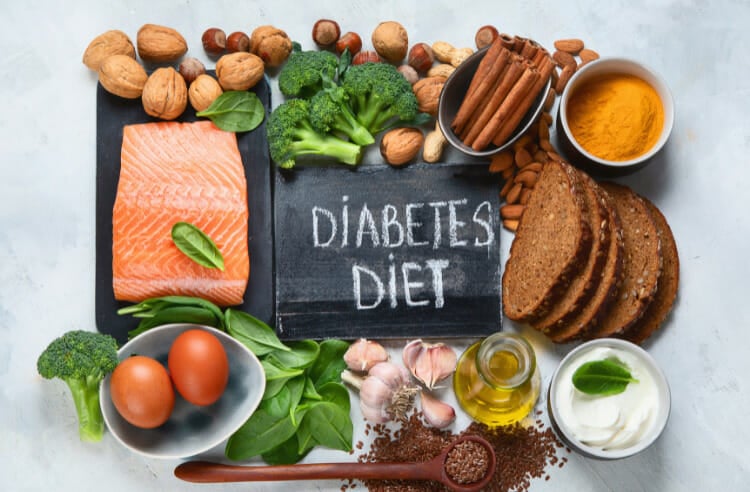
- Υγεία & Διατροφή
-
by k.mammasis
It doesn’t have to be difficult to determine the best foods for diabetes. To keep things simple, your main goal should be to maintain your blood sugar levels under control. Diabetes prevention and management can be greatly aided by healthy nutrition choices, but sometimes that extra functional ingredient is missing. Thus, although one seems to be making the right food choices, the real benefit is yet to be reflected in blood sugar measurements. This is why we have developed an exceptional range of vegan functional foods for diabetes; in order to make sure that you get that extra functional ingredient you need. High Phenolic Olive Oil with Vegan Omega 3 6 9 does miracles when it comes to diabetes and is definitely worth considering as your natural healing food for the reasons discussed below.
Best Foods for Diabetes
When you have diabetes, your food choices are extremely important. Some are superior to others; those are called functional foods. Nothing is entirely off-limits. Even products that you might consider “the worst” could be occasional treats if consumed in small quantities. However, they will not help you with your nutrition, and it is easier to manage your diabetes if you stick to the “best” options. So below we have created a list containing 8 of the best foods for diabetes:
1. High Phenolic Olive Oil
High phenolic olive oil is possibly the best plant-based, functional food for diabetes and will truly benefit you or your kid’s health. Our High Phenolic Olive Oil with Vegan Omega 3 6 9 contains the most complete set of bioactive compounds of the olive tree in a ready-to-absorb form, with many pharmacological properties. Omega-9 (oleic acid) has been found to improve glycemic management. In a major meta-analysis of 32 trials examining various forms of fat, olive oil was the only one found to reduce the risk of heart disease 1. Moreover, in another study eleven overweight diabetes type 2 patients who were not on insulin were asked to stick to their usual diet for a period of eight weeks. They were instructed to ingest refined olive oil (ROO, polyphenols not detected) for the first four weeks (wash-out period), and then to substitute ROO with HP-EVOO (25 mL/day, 577 mg of phenolic compounds/kg) for the remaining four weeks. In obese patients, daily ingestion of high phenolic olive oil may enhance metabolic regulation and the profile of circulating inflammatory adipokines 2. High-phenolic olive oil is in fact a multi-functional food suitable for heart, brain, and inflammation – especially due to the high content of oleocanthal. Oleocanthal is a bioactive compound found solely in high phenolic olive oil that possesses strong anti-inflammatory properties similar to ibuprofen.
2. Omega-3 Fatty Acids from Algae or Fish
Whether plant-based or not, omega-3 fatty acids ALA, DHA and EPA provide significant heart health advantages 3. Algae, salmon, sardines, herring, anchovies, and mackerel are all very high in omega-3s. A study of 68 persons with overweight or obesity discovered that those who consumed omega-3 fatty acids had significantly lower post-meal blood sugar levels 4. Our planet needs to maintain our resources and biodiversity and for this reason, we have developed a product that is plant-based and contains it all: EPA, DHA, and ALA + unique bioactive compounds in the form of polyphenols. This is the reason that our high phenolic olive oil is awarded 3 health claims.
3. Leafy Greens
Green leafy veggies are high in nutrients and low in calories. They’re also low in digestible carbs, or carbs absorbed by the body, so they won’t have a big impact on your blood sugar levels. According to some studies, people with diabetes have lower vitamin C levels than those who do not have diabetes, and they may have higher vitamin C requirements 5. Spinach, kale, and other leafy greens are very good sources of many vitamins and minerals, including vitamin C.
3. Avocados
Avocados include less than 1 gram of sugar, little carbohydrates, a high fiber content, and healthy fats, so they won’t spike your blood sugar. Avocado consumption is also linked to better overall diet quality as well as significantly reduced body weight and BMI (BMI).
Avocados are therefore an excellent food for diabetes, especially since obesity increases the risk of getting diabetes. A 2019 mouse study discovered that avocatin B (AvoB), a lipid molecule found only in avocados, suppresses incomplete oxidation in skeletal muscle and the pancreas, lowering insulin resistance 6.
5. Chia Seeds
Chia seeds are among the best functional foods for people with diabetes. They’re high in fiber but low in carbohydrates. In fact, 11 of the 12 grams of carbs in a 28-gram (1-ounce) meal of chia seeds are fiber, which does not spike blood sugar levels. Chia seeds’ viscous fiber can actually lower blood sugar levels by decreasing the rate at which food travels through your gut and is absorbed. Because fiber suppresses hunger and makes you feel full, chia seeds may help you maintain a healthy weight. Chia seeds may also aid in the maintenance of glycemic control in diabetics 7.
6. Greek Yogurt – Choose the Right One
No, every yogurt is not equal and it is most likely that the common yogurt you buy in the supermarket will not do any good to you. Mainly because it does not have the live organisms that are so good for your gut and microbiome but also because most of them contain artificials, preservatives, and sweeteners. Therefore, it is important to choose a yogurt and not something like yogurt. A long-term study incorporating health data from over 100,000 people discovered that eating yogurt on a regular basis was associated with an 18% decreased chance of acquiring type 2 diabetes 8. Yogurt and other dairy foods may help people with type 2 diabetes lose weight and improve their body composition, according to research 9.
7. Nuts
Nuts are tasty, nutritious, and incredibly healthful. The majority of nuts contain fiber and are low in net carbohydrates, while some contain more than others. A 2019 study involving over 16,000 people with type 2 diabetes discovered that eating tree nuts like walnuts, almonds, hazelnuts, and pistachios reduced their risk of heart disease and death 10. In addition, a different study of people with type 2 diabetes discovered that consuming walnut oil on a daily basis improved blood glucose levels 11. This study is significant because persons with type 2 diabetes frequently have high insulin levels, which are associated with obesity.
8. Whole Grains
Whole grains have more fiber and minerals than processed white grains. Because fiber slows digestion, it is crucial for diabetics to consume a fiber-rich diet. Slower nutrition absorption aids in the maintenance of steady blood sugar levels. Whole wheat bread and whole grains have a lower glycemic index (GI) than white bread and rice. This means they have a lower impact on blood sugar. In a recent large study containing 158.259 women and 36.525 men who did not have type 2 diabetes, cardiovascular disease, or cancer at baseline, the consumption of total whole grains, such as whole grain morning cereal, oatmeal, dark bread, brown rice, added bran, and wheat germ, was found to be strongly correlated with a decreased risk of type 2 diabetes 12. These findings provide additional support for current recommendations to increase whole grain consumption as part of a healthy diet for type 2 diabetes prevention.
Why Functional Foods is Best when added to your Diet?
Trust us, it is very hard to source an effective functional food that is also natural. In most cases, it is not sufficient to make only good food choices. It requires an extra step that is usually sought in supplements. At MILESTONE®, we have created a range of functional foods that are natural, chemical-free, and originate from foods, not synthetics. We have created unique, synergistic formulas with vitamin D3, omega-3 fatty acids, bioactive compounds, enzymes, and more in order to provide you with the extra boost you need.
Vitamin D and Diabetes Type 2
Vitamin D deficiency may have a detrimental impact on the metabolic pathways that lead to the development of Type 2 Diabetes (T2D), such as impaired pancreatic beta cell function, insulin resistance, and inflammation. Higher vitamin D blood levels have been linked to decreased risks of T2D in prospective observational studies 13.
The Nurses’ Health Study tracked over 83,000 women without diabetes at the start to see if they developed T2D. Throughout the 20-year trial, vitamin D and calcium intakes from diet and supplements were monitored 14. When the authors compared women with the greatest intakes of vitamin D from supplements to women with the lowest intakes, they discovered a 13% decreased risk of getting T2D. When comparing the highest intakes of calcium and vitamin D from supplements (>1,200 mg, >800 IU daily) with the lowest intakes (600 mg, 400 IU), the effect was even stronger: there was a 33% lower risk of T2D in women when comparing the highest intakes (>1,200 mg, >800 IU daily) with the lowest intakes (600 mg, 400 IU).
In another important clinical study in 2019, vitamin D treatment reduced the incidence of diabetes among those who had the lowest blood levels of vitamin D at the start of the research. This is consistent with the fundamental concept that taking extra vitamin D may not benefit people with appropriate vitamin D blood levels, but may benefit those with initially low blood levels 15.
Worst Foods for Diabetes
Diabetes raises your chances of developing heart disease and stroke by hastening the formation of clogged and hardened arteries. Foods containing the following ingredients may work against your objective of eating a heart-healthy diet.
– Saturated fats: high-fat dairy products and animal proteins such as butter, beef, hot dogs, sausage, and bacon should be avoided. Limit your use of coconut and palm kernel oils as well.
– Trans fats are dangerous: trans fats should be avoided in processed snacks, baked products, shortening, and stick margarines.
– Cholesterol: high-fat dairy products and high-fat animal proteins, liver, and other organ meats are high in cholesterol. Limit your daily cholesterol intake to no more than 200 milligrams (mg).
– Sodium: aim for a daily sodium intake of fewer than 2,300 mg. If you have high blood pressure, your doctor may advise you to aim for even less.
Summary
Diabetes increases the risk of various major diseases if it is not effectively treated. However, eating foods that assist regulate blood sugar, insulin, and inflammation can significantly minimize your risk of problems. Remember that, while these items may help regulate blood sugar, the most important aspect in optimal blood sugar management is eating a nutritious, well-balanced diet. So, if you are ready to dive into the world of great food choices to assist you in regulating a particular health issue such as diabetes, then feel free to navigate to our corresponding health category and discover the benefits of our functional foods for diabetes.
A Word From MILESTONE®
MILESTONE® Food for your Genes uses only high-quality sources, including peer-reviewed studies, to support the facts within our articles. Read our editorial process to learn more about how we fact-check and keep our content accurate, reliable, and trustworthy.
- Schwingshackl L, Hoffmann G. Monounsaturated fatty acids, olive oil and health status: a systematic review and meta-analysis of cohort studies. Lipids Health Dis. 2014 Oct 1;13:154. doi: 10.1186/1476-511X-13-154. PMID: 25274026; PMCID: PMC4198773.[↩]
- Santangelo C, Filesi C, Varì R, Scazzocchio B, Filardi T, Fogliano V, D’Archivio M, Giovannini C, Lenzi A, Morano S, Masella R. Consumption of extra-virgin olive oil rich in phenolic compounds improves metabolic control in patients with type 2 diabetes mellitus: a possible involvement of reduced levels of circulating visfatin. J Endocrinol Invest. 2016 Nov;39(11):1295-1301. doi: 10.1007/s40618-016-0506-9. Epub 2016 Jun 25. PMID: 27344308.[↩]
- Omega-3 Fatty Acids and Heart Health[↩]
- Helland A, Bratlie M, Hagen IV, Mjøs SA, Sørnes S, Ingvar Halstensen A, Brokstad KA, Sveier H, Rosenlund G, Mellgren G, Gudbrandsen OA. High intake of fatty fish, but not of lean fish, improved postprandial glucose regulation and increased the n-3 PUFA content in the leucocyte membrane in healthy overweight adults: a randomised trial. Br J Nutr. 2017 May;117(10):1368-1378. doi: 10.1017/S0007114517001234. Epub 2017 Jun 13. PMID: 28606215.[↩]
- Wilson R, Willis J, Gearry R, et al. Inadequate Vitamin C Status in Prediabetes and Type 2 Diabetes Mellitus: Associations with Glycaemic Control, Obesity, and Smoking. Nutrients. 2017;9(9):997. Published 2017 Sep 9. doi:10.3390/nu9090997[↩]
- Ahmed, N., Tcheng, M., Roma, A., Buraczynski, M., Jayanth, P., Rea, K.A., Akhtar, T.A., & Spagnuolo, P.A. (2019). Avocatin B Protects Against Lipotoxicity and Improves Insulin Sensitivity in Diet-Induced Obesity. Molecular nutrition & food research, e1900688 .[↩]
- Vuksan V, Jenkins AL, Brissette C, Choleva L, Jovanovski E, Gibbs AL, Bazinet RP, Au-Yeung F, Zurbau A, Ho HV, Duvnjak L, Sievenpiper JL, Josse RG, Hanna A. Salba-chia (Salvia hispanica L.) in the treatment of overweight and obese patients with type 2 diabetes: A double-blind randomized controlled trial. Nutr Metab Cardiovasc Dis. 2017 Feb;27(2):138-146. doi: 10.1016/j.numecd.2016.11.124. Epub 2016 Dec 9. PMID: 28089080.[↩]
- Chen, M., Sun, Q., Giovannucci, E. et al. Dairy consumption and risk of type 2 diabetes: 3 cohorts of US adults and an updated meta-analysis. BMC Med 12, 215 (2014). https://doi.org/10.1186/s12916-014-0215-1[↩]
- Eales J, Lenoir-Wijnkoop I, King S, et al. Is consuming yoghurt associated with weight management outcomes? Results from a systematic review. Int J Obes (Lond). 2016;40(5):731-746. doi:10.1038/ijo.2015.202[↩]
- Liu G, Guasch-Ferré M, Hu Y, Li Y, Hu FB, Rimm EB, Manson JE, Rexrode KM, Sun Q. Nut Consumption in Relation to Cardiovascular Disease Incidence and Mortality Among Patients With Diabetes Mellitus. Circ Res. 2019 Mar 15;124(6):920-929. doi: 10.1161/CIRCRESAHA.118.314316. PMID: 30776978; PMCID: PMC6417933.[↩]
- Kim Y, Keogh JB, Clifton PM. Benefits of Nut Consumption on Insulin Resistance and Cardiovascular Risk Factors: Multiple Potential Mechanisms of Actions. Nutrients. 2017;9(11):1271. Published 2017 Nov 22. doi:10.3390/nu9111271[↩]
- Hu Y, Ding M, Sampson L, Willett WC, Manson JE, Wang M, Rosner B, Hu FB, Sun Q. Intake of whole grain foods and risk of type 2 diabetes: results from three prospective cohort studies. BMJ. 2020 Jul 8;370:m2206. doi: 10.1136/bmj.m2206. PMID: 32641435; PMCID: PMC7341349.[↩]
- Mitri J, Pittas AG. Vitamin D and diabetes. Endocrinol Metab Clin North Am. 2014 Mar;43(1):205-32.[↩]
- Pittas AG, Dawson-Hughes B, Li T, Van Dam RM, Willett WC, Manson JE, Hu FB. Vitamin D and calcium intake in relation to type 2 diabetes in women. Diabetes care. 2006 Mar 1;29(3):650-6.[↩]
- Pittas AG, Dawson-Hughes B, Sheehan P, Ware JH, Knowler WC, Aroda VR, Brodsky I, Ceglia L, Chadha C, Chatterjee R, Desouza C, Dolor R, Foreyt J, Fuss P, Ghazi A, Hsia DS, Johnson KC, Kashyap SR, Kim S, LeBlanc ES, Lewis MR, Liao E, Neff LM, Nelson J, O’Neil P, Park J, Peters A, Phillips LS, Pratley R, Raskin P, Rasouli N, Robbins D, Rosen C, Vickery EM, Staten M; D2d Research Group. Vitamin D Supplementation and Prevention of Type 2 Diabetes. N Engl J Med. 2019 Aug 8;381(6):520-530[↩]





















